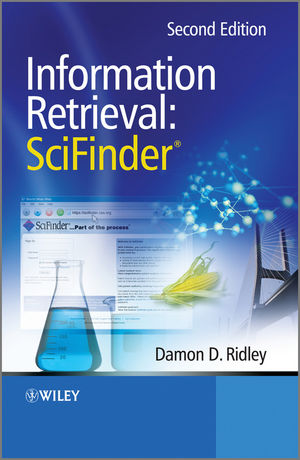Information Retrieval: SciFinder, 2nd EditionISBN: 978-0-470-71247-4
Hardcover
226 pages
November 2009
 |
||||||
Connect with Wiley Publicity
"I just want to do a quick and simple search on…” is often heard in scientific laboratories but, with such a wealth of information available in such a broad range of formats, is a quick search really possible and will the results reveal what you are looking for? This question is particularly relevant for scientists using SciFinder, an enormous and unrivalled set of databases that spans the chemical, engineering, life, medical and physical sciences (including five Chemical Abstract Service databases, part of the American Chemical Society, and the National Library of Medicine bibliographic database Medline) “SciFinder is the nearest thing to a Google for chemists,” says Jenny Cossham, publisher for Chemistry at Wiley UK, ‘Information Retrieval helps chemists get the most out of SciFinder. The second edition incorporates all the latest developments including a guide to the new web-based interface’. But even for something as wide-ranging as SciFinder, the results you are looking for can be found quickly and easily, providing you have the background knowledge…
"…I strongly recommend this book for the library and the laboratory. It is carefully written, very readable and packed with tips…" Chemistry & Industry, 2003
Comprehensive, clearly laid-out and fully updated and revised to include the latest functionality and content of SciFinder, Information Retrieval is the only companion guide to what is fast becoming the standard for chemical information searches. Written by a recognized SciFinder expert, it includes coverage of the last major new release of SciFinder in 2008 (including a new web interface) and is packed full of practical examples, screenshots and top tips boxes. Uncomplicated and logically compiled, the guide discusses the 50+ search, analyze and refine options in the databases including topic, bibliographic, and chemical substance explore options, and post-processing options before going on to:
- Summarize the databases and explain how best to use the unique search and analysis options
- Explain selected algorithms behind the operation of SciFinder and why it helps to understand them
- Show how to apply scientific method to information retrieval
- Demonstrate how to search for chemical structures and chemical reactions
Without doubt, sophisticated information retrieval has become an integral part of the skill set required of professional chemists. In taking the time to read and digest Information Retrieval, scientists can quickly and easily increase their research creativity and productivity.



